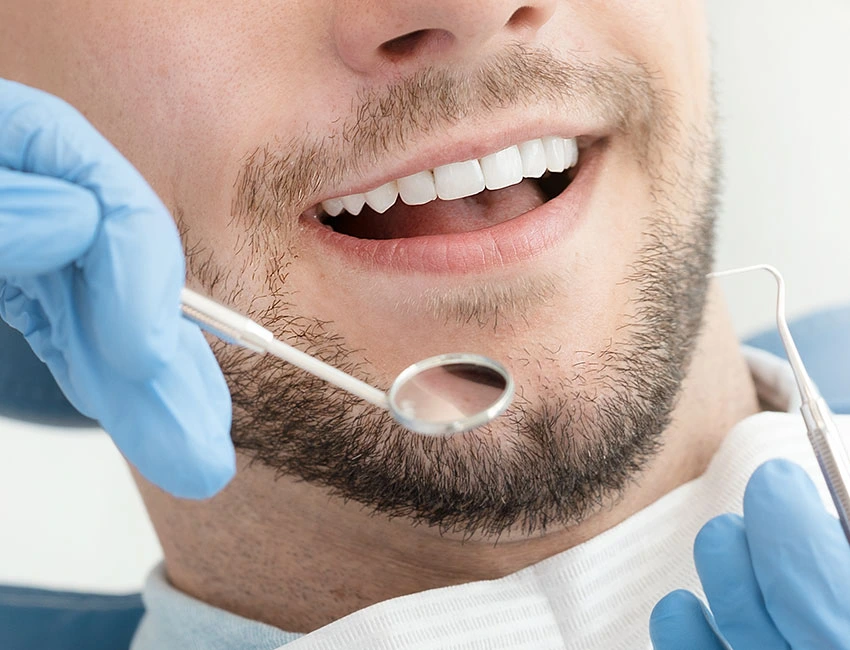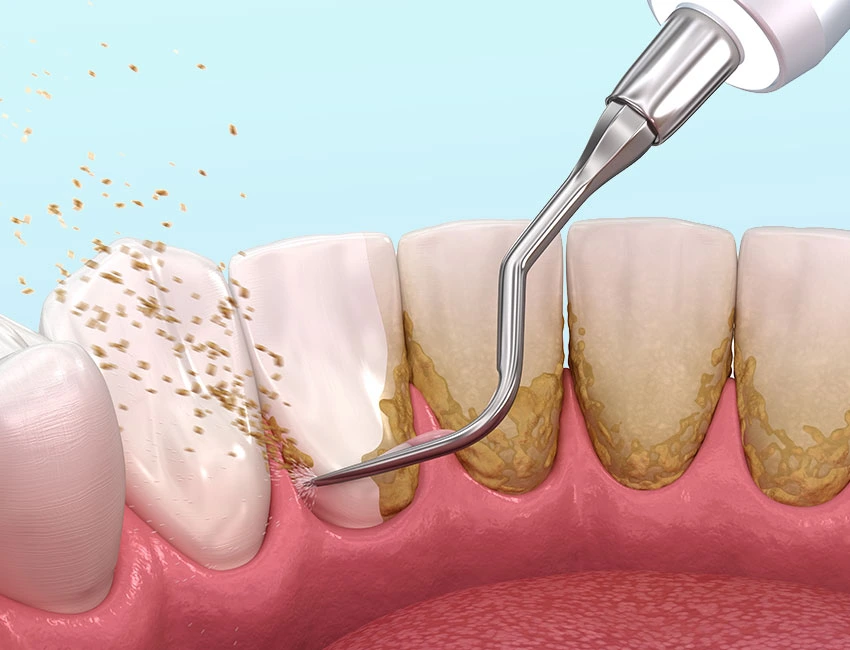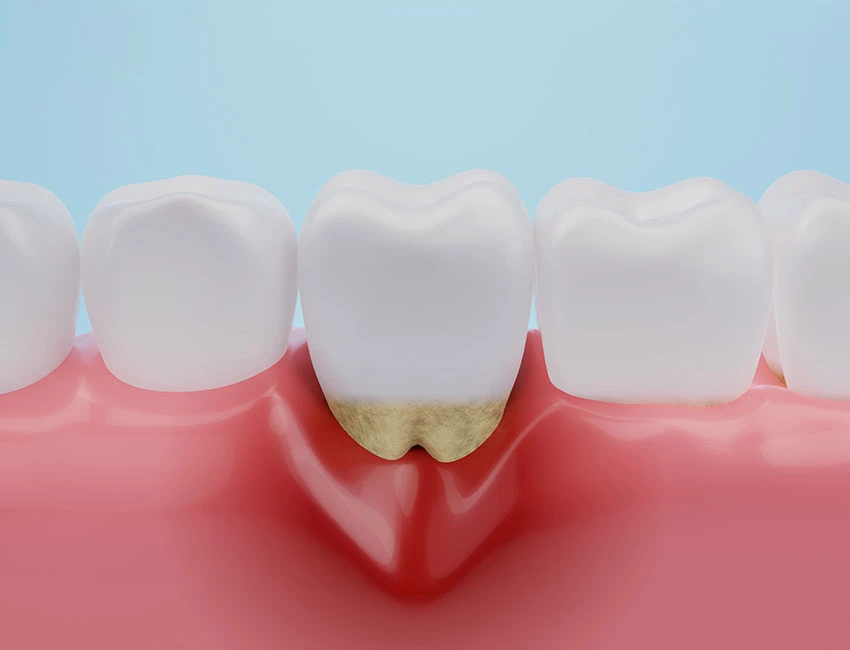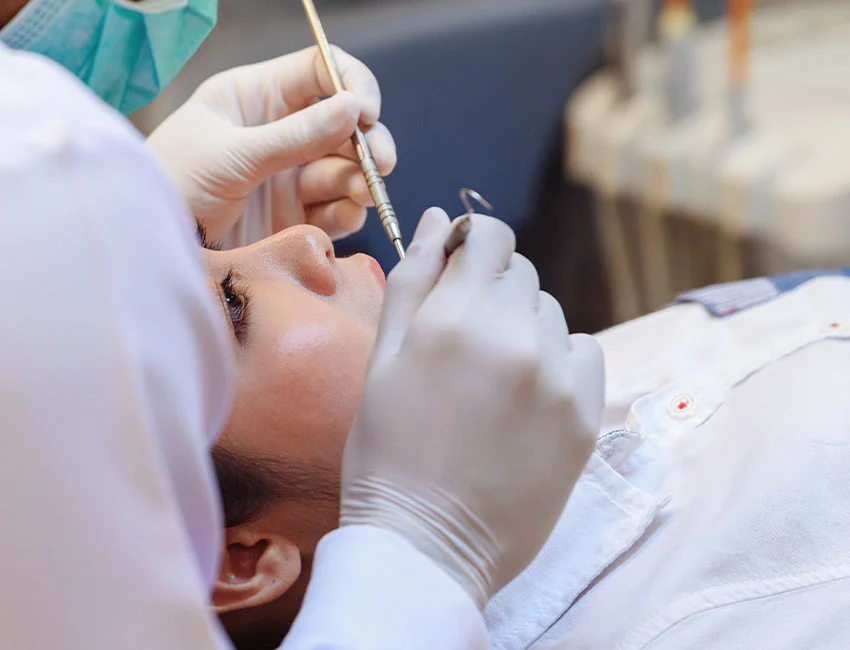Periodontics in Brentwood, Los Angeles, CA
Periodontal disease, also known as gum disease, is an infection in the gums and bones surrounding the teeth. When untreated, periodontal disease can lead to tooth loss, so it’s important to know the signs of gum disease and the steps to take if you have it. Thankfully, early diagnosis of gum infections allows for more proactive treatments to help save your smile. Brentwood Dental Art offers a comprehensive care plan for anyone with gum disease, reducing your risk of tooth loss.

Be proud of your smile
Get the healthy smile you deserve
Treating gum disease is critical to preserving overall health, and Brentwood Dental Art makes it easy and affordable with advanced Periodontal Treatments.
What is a Periodontist? What do Periodontists Do?
A periodontist is a dental specialist who specializes in the treatment of gum disease and is a highly qualified expert-level dentist. They provide the expertise needed when an individual has advanced gum disease and they are experiencing tissue loss. In addition to traditional deep cleanings, a periodontist also offers a wide range of surgical procedures like bone grafts for more advanced stages of the disease.
Do I Need to See a Periodontist?
A dentist may refer a patient to a periodontist if the gum disease is very advanced and doesn’t respond to conventional therapy or if the patient has medical risk factors that pose a health risk. In most situations, mild to moderate gum disease is treated in your general or family dentist’s office, with isolated or advanced areas of severe infection being referred to a specialist.
Because periodontists have access to more advanced resources for treating periodontal disease, they can offer proven results and adjunctive therapies that may not be accessible in a traditional family dental office.
What is Gum Disease (Periodontal Disease)?
Gum disease (periodontal disease) is caused by bacteria that accumulate under the gum tissues and trigger an immune response. Inflammation, redness, and bleeding are common. This infection can cause gum tissues and bone to separate from the teeth, which can eventually lead to tooth loss.
The most common symptoms of gum disease include:
- Bad breath
- Red or swollen gums
- Bleeding or tender gums when you brush or floss
- Pain when chewing food
- Loose teeth
- Gum recession
- Spaces between teeth
- “Pockets” under the gum tissue
- Heavy tartar buildup
Although most of us think of periodontal disease as only affecting our smiles, it’s also closely linked to heart, lung, and reproductive health. Active oral infections can easily allow bacteria to spread into the bloodstream and lungs, posing a risk to your immune system and overall wellness.
Stages of Gum Disease
Caught in its earliest stages, gum infections like gingivitis are reversible. But the longer they go unaddressed, the more likely you are to experience tooth and bone loss.
Gingivitis
The first stage of gum disease is a reversible condition called gingivitis. Gingivitis simply refers to the inflammation of gum tissues. Normally symptoms include swelling, redness, and occasional bleeding in the edges of the gums closest to the teeth.
Gingivitis is completely reversible with good home care and routine dental cleanings.
Early to Moderate Periodontitis
Untreated gingivitis will eventually lead to bacterial deposits under the gum tissues, which trigger gum detachment and associated bone loss (creating “pockets” under the gums.) Bone loss is usually noticed during your dental and periodontal exam or on your most recent X-rays.
Treatment for mild to moderate periodontitis usually involves a deep cleaning to remove bacteria and establish a healthy oral environment that can be preserved between checkups.
Advanced Periodontitis
Aggressive, chronic gum disease causes tooth mobility, severe bone loss, and—unless treated promptly—tooth loss. Most advanced cases of periodontal disease are referred to a periodontist for management.

For your free consultation, contact us today! We have everything you need to treat periodontal disease.
Types of Periodontal Treatments Available
Non-surgical periodontal treatment is usually the first option for managing gum disease. But the more aggressive the condition becomes, the more likely additional therapies will be needed to prevent tooth loss.
Deep Cleanings
During a deep cleaning, a periodontist, dentist, or hygienist will use an instrument called a scaler to remove plaque and tartar buildup under the gum tissues (on the surfaces of tooth roots.) Deep cleanings are usually performed using local anesthetic to numb the teeth being cleaned. In most cases, half of the mouth is cleaned at a time, allowing for a 1-2 week period between appointments.
Because preventative cleanings are inadequate for treating gum disease, this deep cleaning targets the infection at its source. In most cases, the majority of periodontal patients only receive a deep cleaning and do not need additional treatments other than modified home care.
Flap Surgery or Pocket Reduction
If you have advanced periodontal disease, your dentist or Brentwood periodontist might suggest flap surgery. This procedure involves retracting the gum tissues to access severe, deep areas of infection. The specialist will then close the flap back over the tooth and suture it in place for healing and reattachment.
Pocket reduction surgery also involves adjustments to the gum tissue around infected teeth. By removing diseased tissues and reducing the height of the gums around teeth, the infected “pocket” is shortened and, thereby, easier to clean each day. This procedure is also called “crown lengthening.”
Bone and/or Soft Tissue Grafting
When a tooth is at risk because of inadequate bone or gum support, our Brentwood dentist may recommend adding a graft. Grafts place new bone or synthetic bone into the area around the tooth, offering structural support. Whereas soft tissue (gum) grafts cover exposed root surfaces, protecting them against bacteria and sensitivity.
Other Adjunctive Treatments
Depending on who you see for periodontitis treatment, laser pocket disinfection is another adjunctive procedure that could be useful. Using soft tissue laser technology, infected tissues are removed while healthy ones are stimulated to reattach to your tooth surface.
Locally placed antibiotic therapy may also be recommended. These small capsules are slipped under the gum tissues in areas of advanced periodontitis to help improve healing following a deep cleaning appointment.

Brentwood Dental Art offers the comprehensive dental care you need to restore the health and function of your gums.
Periodontal Treatment in Brentwood
If you are experiencing symptoms of gum disease, contact our Brentwood dentist today. Untreated, periodontal infections can pose a risk to your overall health, too. Call Brentwood Dental Art to reserve your next periodontal assessment and discuss your treatment options.
Questions Answered on This Page
- What is a Periodontist? What do Periodontists Do?
- Do I Need to See a Periodontist?
- What is Gum Disease (Periodontal Disease)?
- Stages of Gum Disease
- Types of Periodontal Treatments Available
Related Topics
Definition of common periodontitis terminology
Periodontics: Periodontics is a dental specialty involving different oral structures especially the gums, teeth, and bones.
Bone Graft: A dental bone graft is a procedure to add more bone in a part of the jaw where bone has been lost or where additional support is needed.
Tartar: Tartar is a hard yellowish substance that forms on your teeth and causes them to decay if it is not removed.
Periodontal Surgery: Periodontal surgery is a dental procedure to restore the look and function of teeth, gums, and bone damaged due to severe gum disease.

The Brentwood Dental Art Experience
- Pain free treatments
- Friendly and Caring Staff
- Affordable Financing Options
- Same-day appointment for emergencies
Hear From Our Patients
Brentwood Dental is very professional and the doctor and all of her assistants are very accommodating and caring regarding their patients needs.
This dentist and the lady that helps her went above and beyond the call of duty. A crown of mine came off a few days before XMAS and my regular dentist was out of town. So this Dentist filled in late Friday the 22nd in the evening staying open until I could find their location. I highly recommend them. They have a heart along with the drills they use.
I recently had my tooth pulled out at Brentwood Dental Art. The dental team here excelled at the tooth extraction—skillful and considerate throughout. The friendly staffs transparency and clear communication greatly eased any nervousness that I had. Overall, very positive experience, and highly recommend!
Book Your Free Consultation Today
The first step to a healthy mouth and the smile of your dreams
About our Dentistry
- CA (License #16796). View License Information
- Insurance: We work with most insurance providers including all PPO’s
- No Insurance? No problem call 213-463-8870 for more information
- Financing Options: We offer a wide range of dental financing options
- We serve patients from the following counties: Los Angeles
- We serve patients from the following cities: West Los Angeles, Brentwood, Beverly Hills, Bel Air, Culver City, Santa Monica and Westwood
- Have Questions? Please feel free to contact us at 213-463-8870
Helpful links: WebMD (Periodontal Disease) | ADA (Glossary of Dental Terms)

